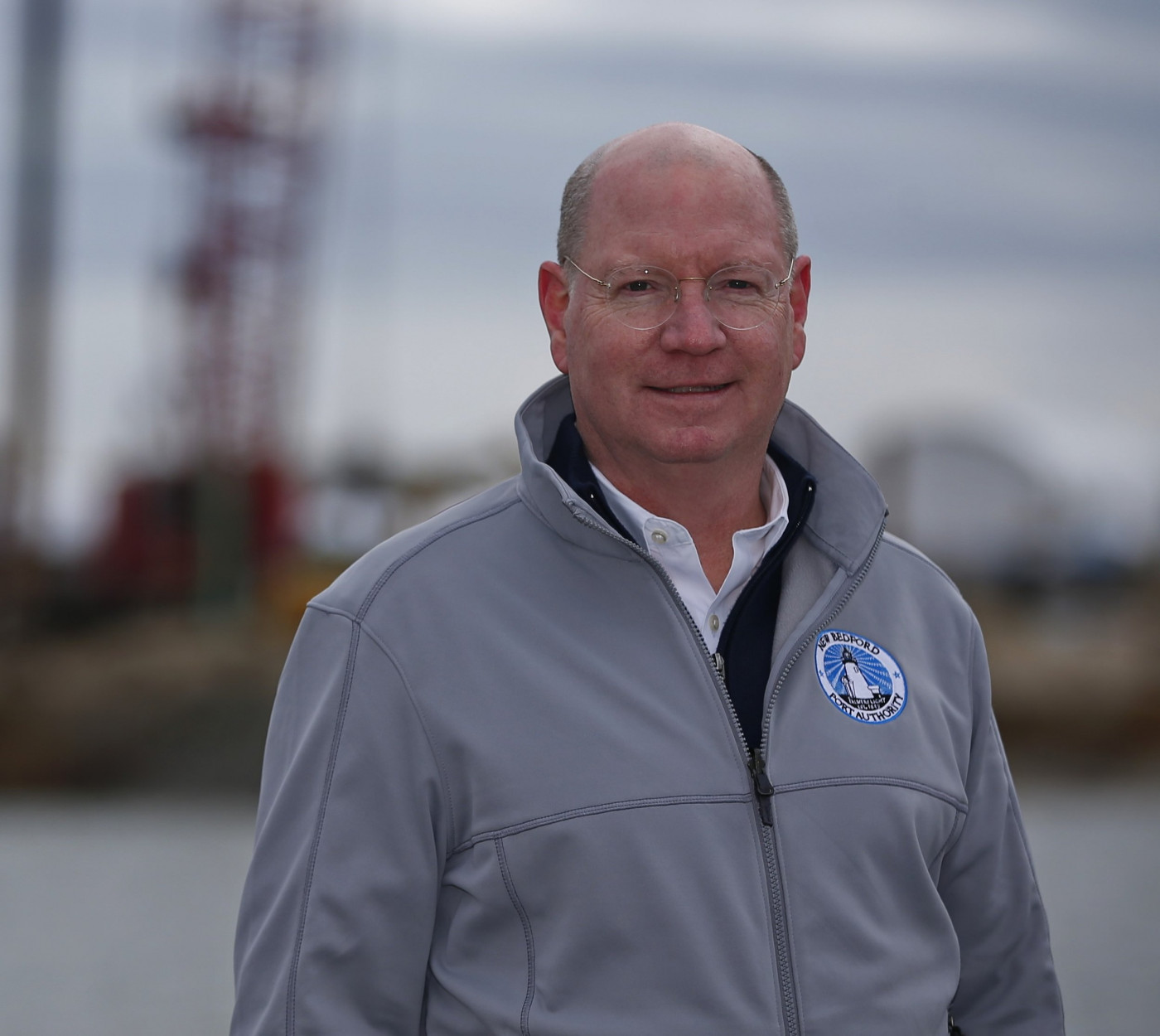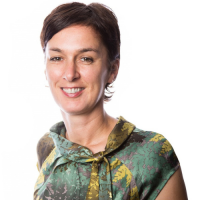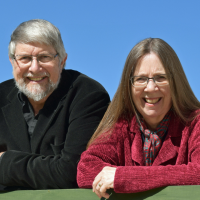Gordon Carr is the Executive Director of the Port of New Bedford in Massachussetts, USA. New Bedford is the most valuable fishing port in the United States, and is now also the base of a growing offshore wind industry, whose turbines are transported from the port out to sea. This is made interesting because the port of New Bedford has a hurricane barrier across its exit, with a gap of 150 feet to ensure the passage of navigation.
For Carr, his day job involves juggling the needs of fishing, shipping, and commercial wind operators. These needs may sometimes be conflicting. He also needs to find more space in an already overcrowded port, while ensuring that all port users are safe in a complex and crowded maritime environment. Carr is symbolic of port employees around the world, who have to deal with competing interests, heavy machinery, and the elements. They are first line responders and don’t get the praise that firefighters or police get. But they should.

I came in October of 2022, but I have been in and around New Bedford professionally for most of my career. For the past seven or so years prior to joining here, I was at the Massachusetts Port Authority, which runs the Port of Boston including Logan International Airport, the Conley Container Terminal and the cruise terminal. And a whole bunch of very valuable commercial real estate around the waterfront in Boston. But the opportunity opened up here and with everything that's going on, the arrival of offshore wind and the very real challenge of trying to strike that balance between commercial Fishing and offshore wind, it was irresistible. Despite the baseline knowledge I had, my learning curve has been pretty steep. It’s been interesting particularly because the offshore wind industry is relatively new for the US too.
I was on the Harbour Master vessel for the first transit. It was a calm and sunny day, perfect. It took a fairly long time to pass through and then it went through and we all breathed a sigh. Then the Harbour Master turned to me and said, “Only another 123 times.” Because you don’t realise, you’ve got to do this and it has to be perfect every time. After that I asked the team, how many vessel movements are there now in the harbour? It wasn’t something we really tracked. Fishing boats come and go. Recreational boats come and go. It was instilled in me at Massport that safety was the first question on every single thing that comes up. And so here too, it was, “how do we make sure that this is done safely, particularly with recreational boats that are here in the summer?” Fishermen know that little boat gets out of the way of big boat. That rule of law of the sea is well known. But the recreational folks may not. And it’s a sort of attractive nuisance: you would want to get up close to see something big if you were on a boat. So I sat down with the Harbour Master and we’ve set up an escort programme.
Just before I came in here I was on what's called a go no-go call. So every time they're going to have one of those vessel arrivals or departures, they notify us. We secure three or four blue light, harbor master and other vessels on the water to escort the barge and tug system in and around the harbour. So if there's a fishing boat that wants to come or depart, and the thing's coming in the harbour master just says, Nope, you have to wait. Just shove aside. And fortunately it's been only maybe a 15 or 20 minute wait for the fishing boat and then the barge comes through and then the harbour master lets them depart or re-enter.
No, they've been pretty understanding about it. Partly because it's a pretty short amount of time. I was initially afraid that we would be shutting down the harbour for an hour or two at a time, which would've been really problematic. But the way it's done is we're just doing it in portions of the harbour where the barge is, or when it lines up to go, everybody stays out of the way because the barge just can't turn at that point. There’s also a notification system, so yesterday I sent a note out to approximately 300 subscribers saying that a barge would be transiting the barrier at approximately noon, for arrival at the berth at approximately 1.15. So checks his watch, he’s like, well I bet I can get out if I leave a bit early, or he decides to have another cup of coffee.
Some combination of the different contractors. I'm learning exactly what that is. Vineyard Wind is the developer, and they've contracted with General Electric (GE) to provide the components. And they’ve contracted separately with a company called Deme out of Belgium who have the vessels to deliver the components. Then there's a company called Foss Maritime which has the tugs that deliver the barges. So GE may really want the components to leave the harbour because they want to keep building out there. And Foss may say, well, it's a little windy, I don't want to risk going through the barrier. Or Deme may say it's too choppy out at sea where the installation vessel is. So they all have to get on the same page, which is why we do that. Go no go. It’s a Zoom meeting, I go around everyone and I say escorts are secured, port authorities are go and GE says, GE’s a go and they do it.
Four in summer because it’s a much more active harbour then. This time of year we can do two in front and one out back. They’re just like pilot boats. They have radios, they’ve got the blue lights and they’ve got the law enforcement. The harbour master here in New Bedford is actually the marine unit of the police department. He reports to me but also to the chief of police.
Yes. So when they get on the radio and say, sorry, you need to , people listen.
There was one close call. A fisherman. It's complicated because of the way the port developed. There is the marine commerce terminal, which is the primary offshore wind, facility. And then these are all the fish offloading houses in South Terminal where all the fishing boats have to go when they come in. Then there are all the fishing wharves where the boats end up right after they've done their offloading. So it's sort of this hopscotch situation, right. If we had a magic wand and I said that's the offshore wind area and that's the fishing area, life would be a lot easier. But fishermen have to cross over here all the time while the offshore wind vessels are going up here.
We ask them to avoid election days, holidays and the day of the marathon, because they all require such a strong police presence. Election days are all hands on deck for the landside law enforcement as well as the marine unit. On marathon day we ask them to leave after 1 or 2 in the afternoon because the marathon is done by then.
Disclaimer: The views and opinions expressed in this article are those of the author and do not necessarily represent those of the Lloyd’s Register Group or Lloyd’s Register Foundation.
Not as much. We’re managing the wharves and making sure the fishing boats can tie up and that they have the services they need. Space management is a big challenge for us because the number of boats that we have in and the limited number of days a year that they’re allowed to fish. They are tied up a long time. My default line is that that is a happiness problem. Envy the port that doesn’t have a space problem! We’ve got $44 million in federal funding to increase our capacity.
They see us as tax collectors in some ways, because they have to pay us for their berthing fees. But I think they appreciate a lot of the investments we’ve made.
I get to the office around 8. Usually on Monday or Tuesday we’ll have a senior staff meeting. There are six of us on the senior staff. In the summertime our numbers go up because we have deck hands and launch drivers at the marina we run. Last Thursday for example I had a meeting with our commissioners, the governing body of the port authority. I separately have a meeting with the mayor every other week. And these days we have lots of visitors of different types. So I had a day last week that was spent with potential offshore wind contractors for future projects here, that brought in leadership from both Denmark and the United States to see New Bedford. So I was a little bit of a salesman and, you know, tour guide for that day.
Yes. The regional organization is called the New England Fisheries Management Council, it's technically advisory to the federal government, but it manages a lot of the surveys and stock research and that kind of thing. They had their quarterly meetings in New Hampshire, so I spent two days up there at those meetings. We go to a lot of conferences around the country because we’re the first offshore wind port in the US. So people want to learn from us.
Image: New Bedford Marine Commerce Terminal by Wosketomp. Image under Creative Commons Attribution-Share Alike 4.0 International license.
-
Chapter 1
Chapter 1
-
Chapter 2
Chapter 2
-
Chapter 3
Chapter 3
-
Chapter 4
Chapter 4
-
Chapter 5
Chapter 5
-
Chapter 6
Chapter 6
-
Chapter 7
Chapter 7
-
Chapter 8
Chapter 8
-
Chapter 9
Chapter 9
-
Chapter 10
Chapter 10
-
Chapter 11
Chapter 11
-
Chapter 12
Chapter 12
-
Chapter 13
Chapter 13




